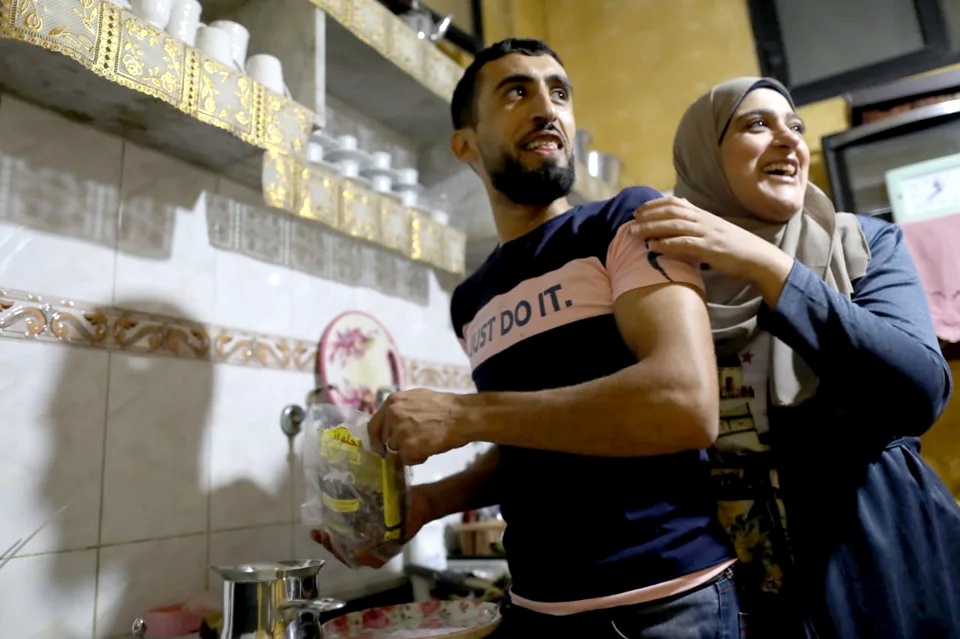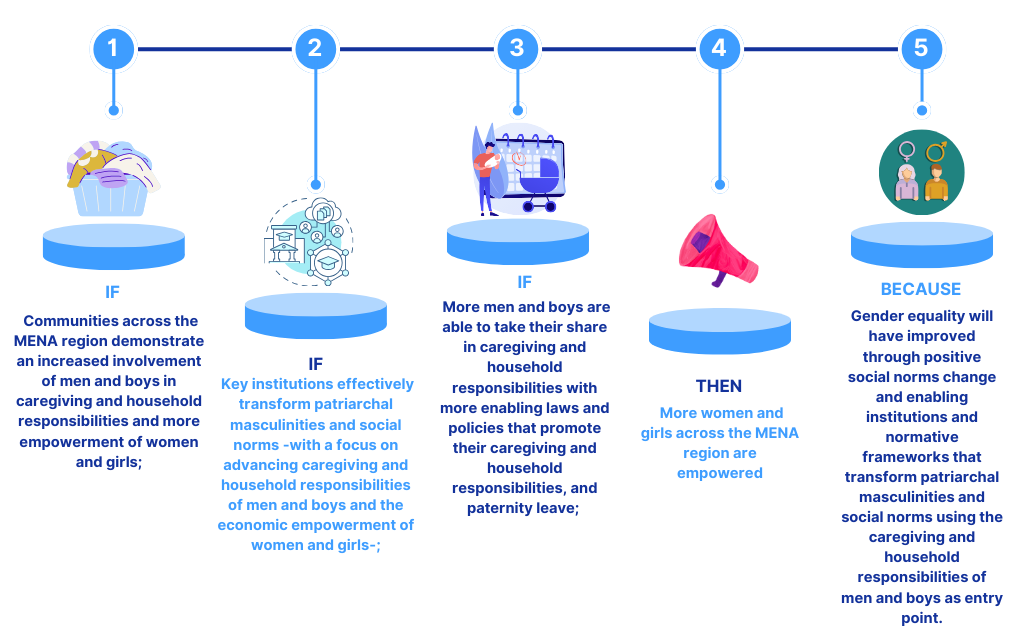‘Dare to Care’: Transforming Patriarchal Masculinities and Social Norms

About Dare to Care
Dare to Care is a groundbreaking regional programme that aims at transforming patriarchal masculinities and social norms and advance gender equality and women’s economic empowerment in the Arab States region. The programme is being implemented from October 2023 to September 2026, with a regional coverage in six countries -Egypt, Jordan, Morocco, Tunisia, Lebanon and Palestine- and in-country investments in four of them -Egypt, Jordan, Morocco and Tunisia.
Dare to Care is funded by the Swedish International Development Cooperation Agency (Sida), the German International Development Cooperation (GIZ), and the Basque Agency for Development Cooperation (AVC). It builds upon the results and lessons learnt of its Sida-funded predecessor regional programme “Men and Women for Gender Equality” (2015- September 2023) and the “Because I am a man” regional campaign.
Our Goals
With the overall goal of ensuring that more women and girls across the Arab States region benefit from the transformation of patriarchal masculinities and social norms, Dare to Care uses the caregiving and household responsibilities of men and boys as strategic entry point and focus to achieve the following:
- Enable communities and societies to advance through the involvement of men and boys in caregiving and household responsibilities and more gender equality and empowerment of women and girls.
- Support key institutions to effectively transform patriarchal masculinities and social norms, with a focus on advancing caregiving and household responsibilities of men and boys and the economic empowerment of women and girls.
- Advocate for laws and policies that promote the caregiving and household responsibilities of men and boys, especially paternity leave.
Our Theory of Change
Dare to Care is guided by evidence from the comprehensive regional research and programmatic evaluations undertaken by UN Women and partners in the Arab States under its predecessor regional programme “Men and Women for Gender Equality.” The Theory of Change of Dare to Care is grounded on the socio-ecological model for social norms change, focusing on attitudinal and behavioral shifts of individuals and families within communities, as well as changes in institutions and normative frameworks (policies and laws).

Our Lines of Action
Youth mobilization:
Dare to Care is amplifying youth voices and engagement in the region through rolling out an action-oriented regional youth-led social mobilization campaign to promote caregiving and household responsibilities of men and boys, and break stereotypes around women’s paid employment. The campaign embeds elements of face to face, social media, and mass media interventions to activate young men and young women from the region to create strong impact at scale. This regional campaign is co-designed by a Youth Advisory Group, formed by 24 young leaders and activists from the Arab region. The campaign is implemented through partnerships with private sector and youth civil society organizations across the region.
Community based interventions:
Dare to Care is piloting and implementing a unique model to increase the amount and quality time that men allocate to unpaid care and domestic work in selected communities in Egypt, Jordan and Morocco. This model is meant to generate positive outcomes for women in the target communities, including reduction of intimate partner violence, and increased participation of women in employment and decision making.
Private sector engagement:
Dare to Care works with private sector to promote more gender equitable workplaces and companies’ involvement to shift masculinities and social norms across the region. This includes the development and roll out of a male allyship manual for private sector in the region, developed in a participatory way with the private sector.
Youth-serving institutions:
Dare to Care works with (and supports) ministries of Youth and universities to stimulate the involvement of young men in unpaid care work and household responsibilities, and to facilitate social norms change for women’s participation in paid employment. Further, the programme supports the establishment and functioning of a regional network of universities to strengthen feminist knowledge production and research on women’s/gender studies.
Religious actors and institutions:
Dare to Care works with religious actors and institutions to promote the involvement of men and boys in unpaid care and household responsibilities, and women’s participation in paid employment. The programme establishes partnerships with religious institutions to promote knowledge production, capacity building and the implementation of a toolkit for religious actors in Egypt, Jordan, Morocco and Tunisia.
Advocacy for men’s caregiving and paternity leave:
Dare to Care works with a wide array of stakeholders to promote legal and policy reforms in favor of men’s caregiving and paternity leave. At regional level, the programme works with the Arab Women Organization (AWO) to undertake regional policy dialogues participated by high ranking officials and technical officers from governments and other organizations, while at country level the programme fosters partnerships with national women’s machineries, women’s CSOs, and other key stakeholders such as private sector parliamentarians and ministries of Labor, Social Affairs and Finances.
Other two regional flagship initiatives of the programme are the establishment and support to the first-ever Regional Network of Male Decision Makers in the Arab States to mobilize men from public institutions for women’s empowerment and gender equitable masculinities; and the facilitation of regional networking and capacity building of women parliamentarians through a strategic partnership with Ra’edat.
Programme Contacts:
- Rodrigo Montero Cano, Regional Programme Manager, rodrigo.montero(at)unwomen.org
- Rana Korayem, Programme Coordinator (ad interim) in Egypt, rana.korayem(at)unwomen.org
- Sanad Nawar, Programme Coordinator in Jordan, sanad.nawar(at)unwomen.org
- Zineb Chebihi, Programme Coordinator in Morocco, zineb.chebihi(at)unwomen.org
- Boutheina Hammami, Programme Coordinator in Tunisia, boutheina.hammami(at)unwomen.org